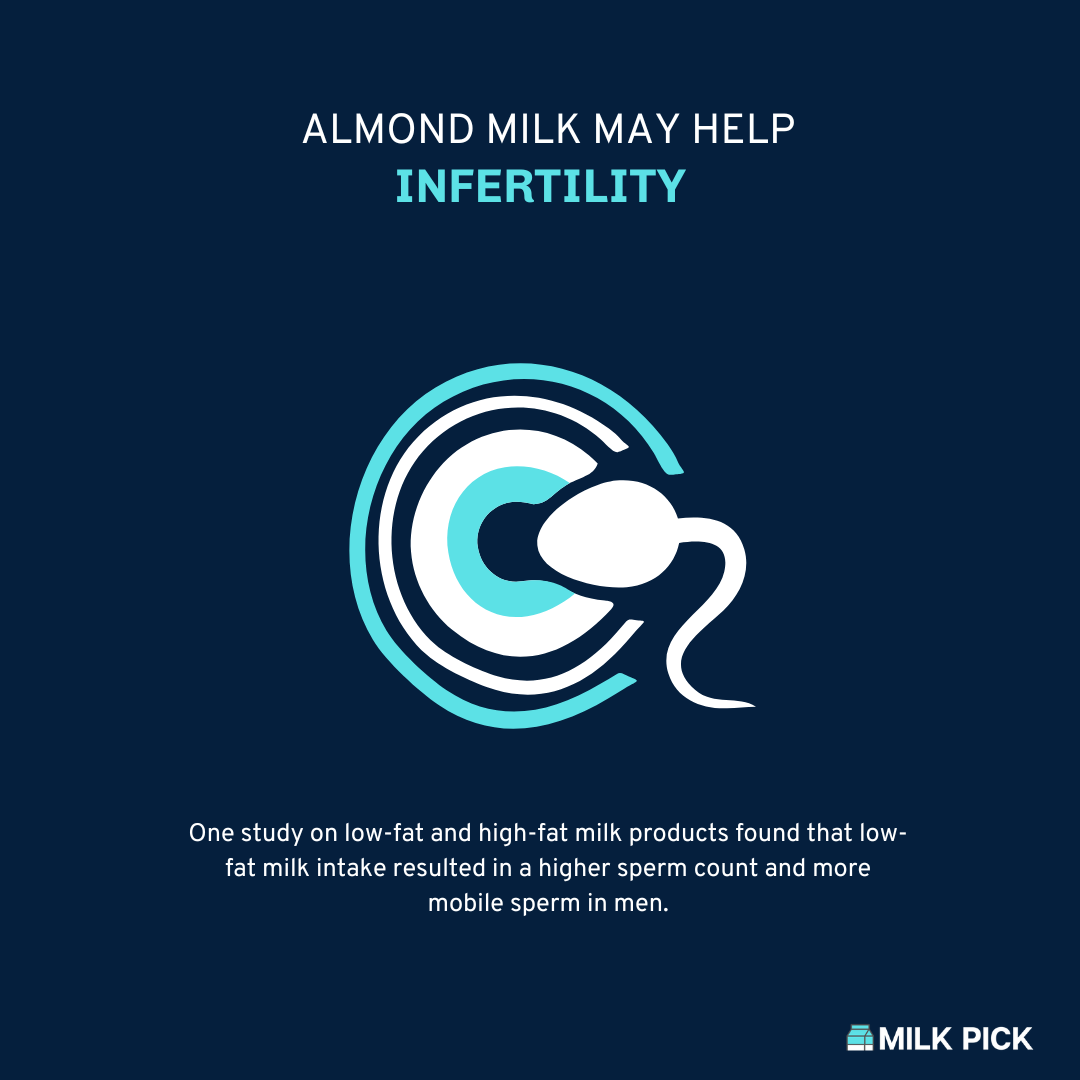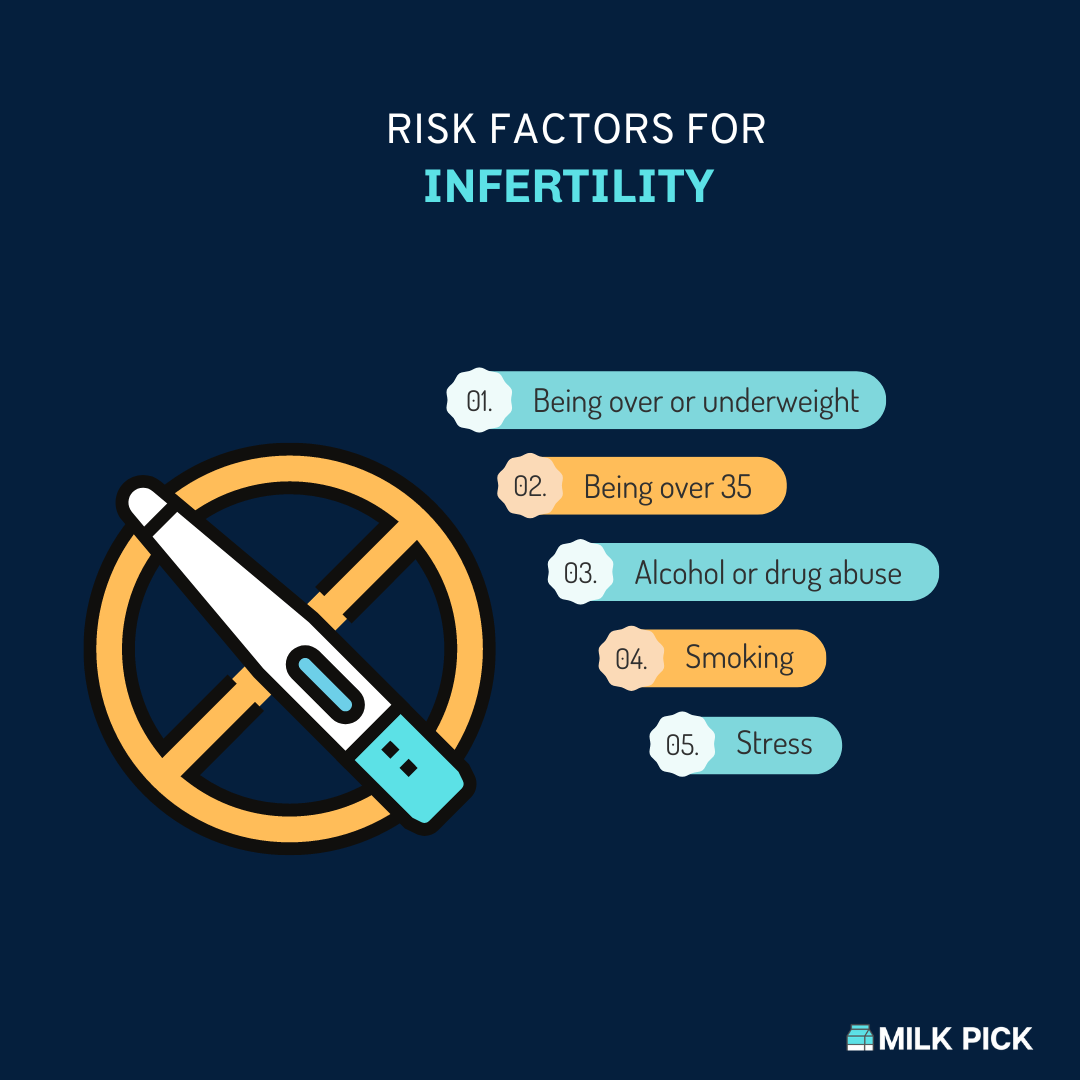If you struggle with fertility issues, exploring every option that may improve your chances of conceiving can help.
While almond milk alone might not help you get pregnant, it may support your overall well-being and provide nutrients that help your body achieve optimal health, improving the potential for conception.
Read on to learn more about the connection between almond milk and fertility, and decide whether or not you should add this plant-based milk to your diet!
Is Almond Milk Good For Fertility?
Almond milk likely won’t affect your ability to conceive if your infertility is caused by issues such as surgical scarring or physical trauma to your sexual organs.
It may also not improve your chances of getting pregnant if you have a condition like endometriosis or PCOS.
However, almond milk might help you optimize your health for conception if you have unexplained infertility caused by excessive weight, poor overall health, or stress.
It might also help if your infertility is caused by a hormonal imbalance or thyroid dysfunction that is affected by foods you eat, such as dairy or meat.
Ways Almond Milk Supports Optimal Health For Fertility
Drinking almond milk supports optimal health for fertility in many ways.
Most notably, almond milk supports a plant-based diet and can enhance your overall well-being.
Here are some other ways almond milk can benefit fertility.
Supports a Plant-Based Diet
Multiple studies have shown that a more plant-based diet leads to better outcomes regarding infertility.
A 2021 article in Advances in Nutrition reinforces these findings.
The article says that women who eat a diet high in added sugars, trans fats, and refined carbohydrates may experience adverse effects on fertility.
Conversely, women who eat more plant-based foods, such as those on the Mediterranean diet, may have an easier time becoming pregnant.
Almond milk is a plant-based beverage made from almonds and water.
It fits perfectly into vegan, vegetarian, and plant-based diets by offering an alternative to dairy milk.
It provides an alternative to dairy milk, which can sometimes negatively impact fertility.
For example, one study found that women who drink low-fat dairy milk may have a higher risk of anovulatory infertility.
Improves Overall Well-Being
Your well-being matters when trying to conceive. Physically, taking care of your body with nutritious foods and exercise is important.
Maintaining your mental well-being is also essential to conception.
If you have struggled with infertility, you may experience increased stress and emotions such as anxiety, shame, or depression.
Unfortunately, infertility and stress are linked in a reciprocal relationship, meaning stress can make it more difficult to become pregnant.
The more issues you face, the more mental and physical problems you experience.
While almond milk doesn’t function as a direct solution to stress, anxiety, or depression, it can help you support and improve your well-being in more subtle ways.
For example, almond milk is generally believed to be good for digestion and gut bacteria.
Unsweetened almond milk is low in carbs and added sugars, which can boost your mood and facilitate beneficial connections between your gut-brain axis.
These factors can help your mind and body relax, which can help you conceive in some cases.
Related: Is Almond Milk Good For Pregnancy?
Helps Maintain a Healthy Weight
Fertility studies consistently include weight as a factor in a woman’s ability to conceive.
People who are obese or overweight and those who are severely underweight may struggle to get pregnant or carry a baby to term.
For instance, women with a BMI of more than 27 are three times more likely to experience infertility.
Therefore, achieving and maintaining a healthy weight is vital if you are trying to conceive and have not been successful.
Almond milk can help you lose or maintain your weight when trying to get pregnant.
Most unsweetened brands of almond milk (non-fortified) contain a nutritional profile similar to New Barn Organics:
- 90 calories per 8 ounces
- 1 gram of carbohydrates
- 8 grams of fat
- 3 grams of protein
- 0 added sugars
This nutritional profile shows that almond milk is low-calorie and low carbohydrate, helping you maintain a diet like Keto or Paleo to lose weight.
If you need to maintain your weight, almond milk offers a healthy alternative to sugary drinks like soda and a lower-calorie alternative to whole milk products or cream.
High In Fertility-Friendly Nutrients
Almond milk can help you consume fertility-friendly nutrients that create a beneficial environment inside your body to conceive.
Diet and nutrients play a significant role in fertility for many women, so consuming these nutrients, vitamins, and minerals regularly may help you get pregnant.
Depending on whether your almond milk is fortified, it may contain part of your daily recommended amount of essential nutrients like:
- Iron
- Vitamin D
- Folic acid
- Calcium
- Potassium
- Magnesium
- Vitamin A
- Vitamin C
Additionally, almond milk (made with clean ingredients) doesn’t contain ingredients harmful to fertility, like trans fat, animal-based protein, and processed carbohydrates.
Boosts Your Partner’s Sperm Quality
Almond milk may boost your partner’s sperm quality in number and mobility.
One study on low-fat and high-fat milk products found that low-fat milk intake resulted in a higher sperm count and more mobile sperm in men.
The study results support that a low-fat alternative like almond milk to whole-fat dairy may benefit fertility.
Many almond milk brands include vitamins and nutrients like Vitamin B2, manganese, magnesium, selenium, and zinc.
According to a 2016 study, these nutrients, often found in nuts like almonds or fortified almond milk, increase men’s sperm quality and result in better fertility.

Are There Any Drawbacks to Drinking Almond Milk When Trying To Conceive?
There are relatively few issues with drinking almond milk when trying to conceive.
If you are allergic to nuts or tree nuts, you must avoid almond milk as it’s made with tree nuts and can cause allergic reactions such as swelling, intestinal discomfort, or anaphylactic shock in severe cases.
Otherwise, the most significant issue with drinking almond milk for fertility is that some almond milk offers little in the way of extra nutrients that your body needs for optimal health.
Homemade almond milk and some store-bought brands may have little protein and no folic acid or vitamin D.
Depending on the rest of your diet, you may need to choose fortified almond milk or supplement it with other foods to ensure you get vitamins and minerals that can help you conceive.
What Are The Most Common Fertility Issues?
Infertility is an issue that affects about 19% of women between 15 to 49 and who have no prior births in the U.S.
Nearly 26% of these women experience impaired fecundity, which refers to difficulty conceiving or carrying a pregnancy to term.
Infertility happens for many reasons, including the following:
Damage to reproductive organs
Damage to any of your reproductive organs can cause infertility.
For example, pelvic inflammatory disease (PID) caused by STIs like chlamydia or previous surgeries can damage your fallopian tubes, causing infertility.
Having tumors or polyps on your uterus or cervix can affect implantation, which means those with a history of these conditions or cervical cancer may have trouble getting pregnant.
Ovulation issues
Your body must release eggs to allow fertilization.
This process is called ovulation. Some ovulation disorders interfere with egg release, making it difficult to get pregnant.
Polycystic ovary syndrome (PCOS) is a common cause of female infertility and causes a hormonal imbalance that adversely affects ovulation.
Hypothalamic dysfunction can impact your hormone production, causing excessive weight gain or loss and preventing ovulation.
Conditions like primary ovarian insufficiency or having too much prolactin can also interfere with ovulation and cause infertility.
Endometriosis
Endometriosis is a condition in which uterine tissue grows outside the uterus.
If you have surgery to remove this tissue, it can lead to scarring in the uterus or fallopian tubes, inhibiting conception.
Endometriosis can also lead to irregular periods and dysmenorrhea (excessive bleeding during periods), which also interfere with ovulation and conception.
Unexplained infertility
Sometimes, infertility doesn’t have a direct, explainable cause.
However, the following risk factors may contribute to the inability to get pregnant:
- Being over 35
- Experiencing excessive stress or untreated mental health issues
- Smoking
- Risky sexual activity
- Problems with alcohol or other substances
- Being overweight or significantly underweight

Bottom Line on Almond Milk and Fertility
Like many health issues, struggles with fertility are highly individual.
You may experience infertility due to conditions such as PCOS, endometriosis, or uterine scarring.
If this is the case, you will likely want to explore fertility options with a specialist who can address your concerns with fertility treatments.
If you are in the early stages of dealing with infecundity or infertility, you may opt for less invasive approaches such as changing your diet or lifestyle and addressing your weight.
Under these circumstances, switching to a plant-based beverage like almond milk may be able to support your efforts to conceive by helping you lose weight and improve your physical and mental health.
It’s always best to work with your doctor to discuss any issue related to fertility and develop an approach that works for you and your partner.
